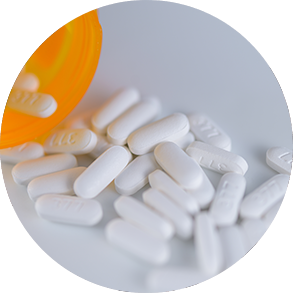Just because medications are prescribed by a doctor does not mean they do not come with risks. As a Palm Springs drug rehab, we know that it is only a small step from abuse to addiction with prescription medications like benzos. Fortunately, our California benzo addiction treatment center offers the services needed to help clients recover from substance abuse both physically and mentally.
What Are Benzos?
Benzos, or benzodiazepines, are a class of drugs known as tranquilizers that depress the central nervous system and slow the body down. Benzos are made up of prescription medications and have been used in the medical field for over 50 years. They’re most commonly prescribed to treat ailments and conditions such as insomnia, anxiety disorders, seizures, and alcohol withdrawal. Some common benzodiazepines include Valium, Xanax, Klonopin, and Ativan.

Benzodiazepines are widely used in the United States. According to research, there were 45 million alprazolam, 26.4 million lorazepam, 29.2 million clonazepam, 12.6 million diazepam, and 7 million temazepam prescriptions written in the U.S. in 2017 alone.1 In addition to treating insomnia, seizure disorders, and anxiety, benzos can be used as muscle relaxants and anticonvulsants. They may also be used in tandem with anesthesia to promote relaxation and sedation.
Benzodiazepines’ mechanism of action works by enhancing the effects of the major inhibitory neurotransmitter, gamma-aminobutyric acid, or GABA, thereby decreasing brain activity. Benzos are classified by their duration of action, which ranges from less than 6 hours to more than 24 hours, depending on the formulation and dose taken. Some benzos also have active metabolites that prolong their side effects.
Who Should Not Take Benzodiazepines?
Not every individual is a good fit for treatment with benzodiazepines. Because of the risk of abuse and addiction, anyone with a history of substance abuse, especially alcohol or illegal narcotics, should stay away from benzodiazepines. It is generally advised against pregnant or nursing women taking these drugs because of potential dangers to the developing fetus or nursing infant. Because benzodiazepines can reduce respiratory function, people with a history of respiratory issues, such as chronic obstructive pulmonary disease (COPD), should use caution when using them. Furthermore, in order to avoid negative effects, people who are hypersensitive to benzodiazepines or similar chemicals should not use these medications. Before writing a prescription for benzodiazepines, medical experts must carefully consider the unique circumstances and medical history of each patient in order to guarantee the safety and effectiveness of the drug.
Signs and Symptoms of Benzodiazepine Abuse
Due to their potential for abuse and addiction, benzodiazepines are Schedule IV drugs, according to the Drug Enforcement Administration (DEA). Tolerance often develops after long-term use of prescription opioids, meaning users require higher doses to achieve the same effects. Physical and psychological dependence may develop as a result, whether a benzodiazepine is taken with a prescription or illicitly.
Most individuals abuse benzodiazepines for their sedative effects illicitly, while patients with prescriptions may take more doses when their bodies adjust to the drug’s effects. Either way, long-term abuse can lead to a variety of problems, including muscle weakness and lowered cognitive ability. Fortunately, with benzo addiction treatment, some of these issues may be reversed.
Signs of benzo addiction include:
- An abundance of pill bottles
- Blurred vision
- Dizziness
- Doctor shopping
- Headaches
- Lethargy
- Lying or secretive behavior
- Mood swings
- Poor judgment or risky behavior
- Slurred speech
In addition to addiction, benzodiazepine overdose is another major risk of abuse. When a person takes too many benzodiazepines at once or takes them with other drugs or alcohol, it can suppress the central nervous system and inhibit core body functions such as heart rate, body temperature, breathing, and blood pressure.
These side effects can cause severe damage to the user’s body and even lead to death if not treated immediately, particularly in cases where the individual mixed benzos with alcohol or other drugs.
Common benzo overdose symptoms include:
- Coma
- Drowsiness
- Impaired judgment
- Nausea and vomiting
- Poor coordination
- Problems breathing
- Slurred speech
- Weakness
If you suspect that a loved one is abusing benzos or you struggle with drug abuse yourself, our California benzo addiction treatment center could help you avoid any long-term complications and dangers like an overdose.
Our CA Benzodiazepine Treatment Program
At our California detox center, we provide benzodiazepine abuse treatment for people struggling with a dependence on these drugs in a safe and comfortable setting. We usually begin the admissions process by running a clinical assessment, which examines the individual’s medical history, health, history of drug use, and more. This is an important assessment done to determine the intensity and longevity of care they require.
For most patients with severe drug use disorders, medical detox is the first step. Our benzodiazepine withdrawal treatment or detox is the process in which clients are slowly weaned off these drugs while under the constant care and supervision of medical staff. Withdrawal can be a highly uncomfortable and even life-threatening process for some patients, particularly those who have used benzos for extended periods. However, because our treatment of benzodiazepine withdrawal is led by our medical staff, patients can receive medication (as needed) to reduce symptoms and make the process safer and more comfortable.
Patients who complete detox will then transition into the next phase of our residential treatment program. This full-time level of care is designed to help patients escape their normal environment and combat their addiction cravings in a safe and peaceful environment, free from judgment. During this program, clients will participate in individual and group therapy sessions, working with our therapists to learn more about their disorders and how best to manage their sobriety after rehab.
Patients in this program can also expect to spend their time participating in various activities, including therapies, exercise programs, and recovery meetings to heal and learn how to live a drug-free life. These programs allow patients to work toward a healthier lifestyle while also inspecting the root causes of their addiction problem. At night, patients will stay at the facility to ensure that they remain on track.
However, because benzodiazepine addiction recovery takes time, the journey to recovery does not end when our treatment program does. Our facility also offers aftercare services, including our alumni program, to ensure clients have access to our sobriety resources and are offered continuous guidance even after completing treatment.
Contact Banyan Palm Springs to Get Started
No matter how long you have been battling a drug or alcohol use disorder, our rehab center is here to help. Our California rehab center is one of many in the Banyan Treatment Centers family, and our doors are open to all in our community who are seeking professional addiction treatment.
For more information about our drug and alcohol treatment programs and how to get started, contact Banyan today, and one of our admissions specialists will reach out to you as soon as possible.
Source:
- DEA - Benzodiazepines
Related Reading:
Most Insurance Plans Accepted
At Banyan Palm Springs, our goal is to make sure that anyone who needs treatment from drug and alcohol addiction is able to get the help needed to assist them on the road to recovery. If you don't have insurance contact us to inquire about alternate methods regarding treatment for yourself or a loved one.











